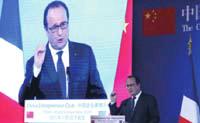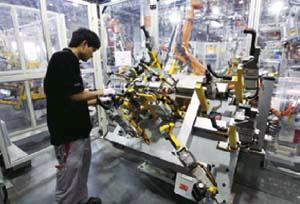China-Europe’s Ruby Jubilee
2016-01-06ByCuiHongjian
By+Cui+Hongjian
It has been a busy few months for China-Europe relations. Shortly after Chinese President Xi Jinpings state visit to Britain, German Chancellor Angela Merkel paid her eighth visit to China since taking office. In quick succession, French President Fran?ois Hollande visited Beijing. At the end of November, President Xi arrived in Paris to attend the global climate change summit, showing support for Frances hosting of the important international event as well as for the city of Paris, which recently suffered a series of terrorist attacks.
In fact, China and Europe have maintained frequent high-level economic and political interactions as well as pragmatic cooperation in recent years, creating the prospect of a golden era in relations.
This first benefited from Chinas steadfast and comprehensive Europe policy. Achieving mutual benefits and win-win results through cooperation and establishing communities of interests have become the clear-cut direction of China-Europe relations. The close mutual interactions between China and these European powers have sent the world a signal that European countries are confident about Chinas economic, social and political prospects and are willing to see the lasting, stable and strong development of the Chinese economy that can help extricate Europe from its prolonged recession.
China also sees cooperation with Europe as a significant opportunity for Chinas development and believes Europe can be an important partner for jointly safe- guarding and improving the international system.
China has made great efforts to push its cooperation with Europe at different levels, including at the national, sub-regional body, and EU levels, via mutual promotion and complementing each others advantages. The result is that China-Europe relations are more comprehensive, systematic and highly efficient.
Another factor that helps promote the development of China-Europe relations is European countries ability to learn from past experiences and their foresight in adapting to the changes of international patterns. Relations between China and major European countries have almost all experienced twists and turns, but European countries have also found the right way to interact with China through the ups and downs. Merkel and British Prime Minister David Cameron also shifted from cautious to active promoters of sound China-Europe relations.
Win-win cooperation has become the mainstream of China-Europe diplomacy.
These changes will inevitably push the overall China-Europe relationship forward.
The American factor
Almost simultaneously with the close interaction between China and European countries, the relations of China and the United States have entered a phase of peaceful coexistence, though not without competition. China hopes to establish a new model of relations with the United States, but is fully aware that achieving it is extremely difficult.
The United States and European countries worldviews and foreign policy objectives vary widely based on their different historical experiences, respective role cognition and interests, which have also determined their different perceptions and policies toward China.
However, no matter how the current China-U.S. and China-Europe relationships change, they all can serve as a source of inspiration and as a learning experience for Chinas building of new-model relations with other major countries and establishing global partnerships.
In recent years, the international state of affairs has seen its share of ups and downs, but the major world powers are putting an emphasis on rebalance and stability. However, different players have different interpretations of balance, responding with different policies. European countries China policies can be seen as a kind of action to seek the rebalance of the world economic and trade structure. Meanwhile, the fundamental starting point for the United Statesrebalancing strategy is based on its self-positioned role as the “leader of the free world.”
Therefore, Washingtons core China pol- icy is “containment,” that is, restricting and weakening any potential threat that China may pose. Some extreme views expounded in the United States even claim to “deprive the conditions for Chinas further development.” However, establishing a new type of relations between China and the United States requires “no confrontation and no conflict.”
Europes interest
When dealing with China, European countries, on the other hand, do not exhibit anxiety about maintaining their status in the world order. They are more aware of the huge opportunities for cooperation under the trend of global wealth transfer, hoping to continue to maintain Europes advantage in the security, political and economic arenas in virtue of the continuous development of China and other emerging economies.
This is of Europes interest. But as long it is achieved through cooperation rather than zero-sum confrontation, it naturally becomes the basis for Europe and China to seek and promote common goals.
The common interests between China and Europe are also well integrated within Chinas own peaceful development strategy. Thus, the core of China-Europe relations can be described as “symbiosis.”
Even if the United States pursues a policy that tries to deprive China of the conditions for sustainable development, China, in addition to preventing this from happening and trying to change expectations, would need to continue to leverage the markets, sources of technology and experience in Europe to maintain and enhance the conditions for development. China would also need to expand its strategic space for international relations and build a more balanced, reasonable and just international order by advancing the development of its relations with European countries.
Chinese officials and scholars should work out a more effective way to rebalance Chinas relations with Western countries, upon which lasting peace and sustained prosperity can be built.
